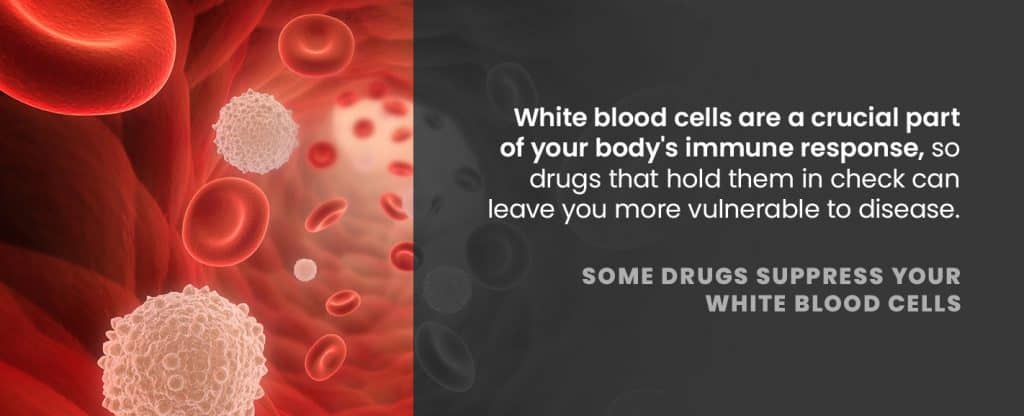
Misusing opioids can heighten your risk of infection and illness.
The immune system has always been a central aspect of overall health. Post-COVID-19, more people are concerned about whether their immune systems are working as well as they could be.
While many factors can affect your immune system, one issue you may not have considered is drug misuse. An in-depth look at the effects of opioids on the immune system can help you make informed steps to improve your health.
What is the Role of the Immune System?
Your body’s immune system is a complex network of cells, proteins and organs. It plays a critical role in neutralizing harm and keeping you healthy. The immune system has three primary responsibilities:
- Fighting pathogens that could cause disease and removing them from the body.
- Identifying and negating harmful environmental substances.
- Combating internal threats, such as cancer cells.
Even with a robust immune system, you could still come down with the occasional cold or infection. That’s perfectly normal, and you will bounce back quickly as your immune system fights off pathogens.
Whenever you encounter germs and don’t end up sick, your immune system has successfully staved off the threat. Sometimes, you may fall ill before your immune system develops stronger immunity to fight those pathogens in the future.
Viruses, bacteria and other dangers are all around you. Even with conscious precautions, it’s impossible to avoid them all. A compromised immune system increases your likelihood of getting sick. You may also take longer to get over an illness.
Immunosuppression can lead to a host of health problems. You can avoid falling ill frequently by strengthening your body’s natural line of defense.
Understanding the Effects of Opioids on the Immune System
Unfortunately, as with all other aspects of physical and mental health, the effects of opioids on the immune system can be quite severe. Individuals with substance use disorder are more at risk for contracting viruses and experiencing more severe symptoms. This is due to their suppressed immune systems and other possible health issues like lung and heart diseases.
Opioids have direct and indirect effects on the immune system. Many of these issues are dependent on the method of ingestion. Regardless, addictive substances can impact every part of the body differently.
1. Drugs are taxing on your immune system
One of the reasons drug misuse weakens the immune system is that addictive substances pose a threat to the body. Your immune system must work harder to neutralize the poison it detects in the bloodstream. If you come into contact with viruses or bacteria, your immune system won’t be able to fight them off. It’s busy working to counteract the effects of drugs on your organs.

2. Some drugs suppress your white blood cells
Most medical providers are hesitant to prescribe opioids for a host of reasons. One reason is the drugs’ suppressant effects on white blood cells. Morphine, in particular, suppresses the activity of three classes of white blood cells: B lymphocytes, T lymphocytes and natural killer cells. White blood cells are a crucial part of your body’s immune response. Drugs that hold them in check can leave you more vulnerable to disease.
3. Some Methods of Drug Administration Add to the Risk
Specific methods of ingesting drugs can entail risks of their own.
Injecting: Injecting drugs can often repeatedly expose a user to viral, fungal and bacterial infections that weaken the immune system.
Snorting: Snorting drugs through the nose can damage your natural mucous membranes. This allows pathogens to enter your body more easily and cause upper respiratory infections.
Smoking: Since smoking damages lung health, this method of administering a drug can make a person more vulnerable to severe complications. Illnesses that affect the respiratory system can affect the brain and other organs that depend on flowing oxygen.
4. Drug Abuse Often Entails Other Unhealthy Behaviors
Another notable issue is that many people who struggle with a substance use disorder often engage in other unhealthy practices. These may include irregular sleeping habits, a poor diet or risky behaviors. Addressing drug abuse can also help someone adopt a healthier lifestyle overall, boosting their immune system in various ways.
How to Improve Immune System Functionality
If you want to strengthen your immune system so you can improve your overall health, consider taking these steps.
Exercise regularly: Exercise is vital for a healthy lifestyle and a robust immune system. Even a quick walk around the block can help improve your body’s circulation. Better circulation encourages elements in your immune system to move through your body efficiently.
Improve your diet: A balanced diet is also key for overall wellbeing. Your immune system needs adequate nutrients to perform at its peak. A healthy diet can also help you avoid obesity, which links to lower immune function.
Take immune-boosting supplements: Health researchers haven’t reached a consensus on the efficacy of taking supplements to improve your immune system. However, some supplements have shown promise for potentially bolstering the immune system. Some examples include vitamin B6, vitamin C, vitamin D, vitamin E and zinc.
Enter a treatment program: Considering drugs’ impact on the body and the immune system, eliminating them is beneficial. Reducing harmful drug use in your life can be a significant step toward better health. If you’re struggling with a substance use disorder, consider entering an evidence-based treatment program that can help you recover.
Begin Your Journey to Recovery and a Healthier You
If you or a loved one is living with opioid addiction, now is the time to take the first steps toward recovery. Addiction treatment can improve your immune system and enable you to enjoy improved physical and mental health. At AppleGate Recovery, we understand that opioid addiction can feel like a nearly insurmountable challenge to conquer alone.
That’s why we offer medication-assisted treatment to help our clients comfortably and effectively transition away from opioid dependency towards better health. We specialize in outpatient treatment and conscientiously protect your privacy. You can receive help without a major disruption to your life.
As an AppleGate client, you’ll receive counseling to support you on your journey to recovery and help you avoid relapse.
To get started, find a treatment center near you and sign up for a visit or an appointment.

Contact AppleGate Recovery Today
If opioid addiction is impacting your life or the life of someone you care about, reach out to our treatment center. We are here to provide the support and care you need to take the first step toward recovery.
Call 888.488.5337